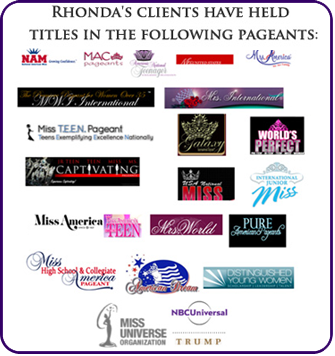The pageant director is the heart of a pageant. They set the tone, create the environment and determine the quality of the experience on pageant day. The pageant director is the first person to approach when you have general questions, not coaching questions, about the pageant.
The difference between a general and coaching question is this.
A general question is information that pertains to everyone in the pageant and is factual. Coaching questions are opinion based and specific to the individual. For example, to ask what style of gown is appropriate for the pageant is a general question and okay to ask the director. However, sending a photo of yourself wearing a gown and asking the director what he or she thinks of it is not appropriate. That’s what your coach is for.
Read all of your paperwork first before contacting the director.
Here is a list of general questions you can ask the pageant director to help you prepare if it’s not covered in your paperwork.
- Am I allowed to take pictures and/or video during the pageant?
- Am I required to purchase an ad page for the program and how much is it?
- What are the mandatory expenses?
- Am I allowed to reformat my judge’s bio, or do I need to follow your template exactly?
- Am I (or stylists) allowed into the dressing room to help my daughter with clothing changes, hair, and makeup?
- What kind of drink and food is allowed in the dressing room? Do I need to bring my own clothing rack, long mirror, power strip, and extension cord?
- For interview, do you want the contestants to wear hose and closed toe taupe shoes or are bare legs and open toed shoes acceptable?
- For interview, do you want a classic suit (jacket with matching skirt), or is a fashion-forward dress okay?
- What length of hemline do you want to see on the interview attire?
- Do you want ball gowns, above the knee, or gowns with slits for formal wear?
- How glitzy do you want the clothing to be?
- Ask for clarification on what the pageants’ definition of fun fashion/ casual wear is: real clothing that people buy off the rack, high-low dress, red carpet, is denim allowed (in almost all cases NO ), are pants or capris allowed, are props allowed (hats, purses, masks, bags, etc).
- If your pageant has a timed personal introduction (NAM, COED, IJM, Teen America) make sure you ask if the time limit is a guideline or if points are deducted for introductions that go over the time limit.
- If your daughter wins, can she participate in other pageants while she holds this title?
- What expenses are covered by the pageant for your daughter to compete at the next level? For example, if you’re competing at a local preliminary, what’s covered for the state pageant? If you’re competing in the state pageant, what’s covered for the national?
- What are the appearance requirements of the titleholder?
- What is the modeling style like for this pageant? Traditional pageant walk, straight modeling with no hand gestures, high fashion runway? It may differ with each category so ask. It’s okay to ask about the walking pattern, too. Which side of the stage will you enter? How many stops? Where will you exit the stage?
- Will you receive scores and feedback after the pageant? What is that timeline and how should you be looking for it (mail, email, a phone call).FYI, most pageants do not give scores or feedback after the pageant so be appreciative for the ones that do.
Be respectful of the director’s time. Think of all the questions you may have ahead of time and send them in one email, or ask them in one phone conversation. As the pageant time gets closer, directors do not have the time to answer individual questions because their focus shifts into production mode. It’s nothing personal. They have a show to produce and hundreds of details to manage.
Meet all their deadlines. Communication is critical. Directors are wonderful people who want you to participate in their pageant. If you are having challenges with the deadlines, talk with them. Don’t wait until the last minute. In order to plan the best experience for all contestants, they need to have the fees paid and know how many contestants are going to be in the pageant.
You are ultimately responsible for your pageant preparation. Once you understand the rules and expectations of the pageant, all the details are up to you and your team.




